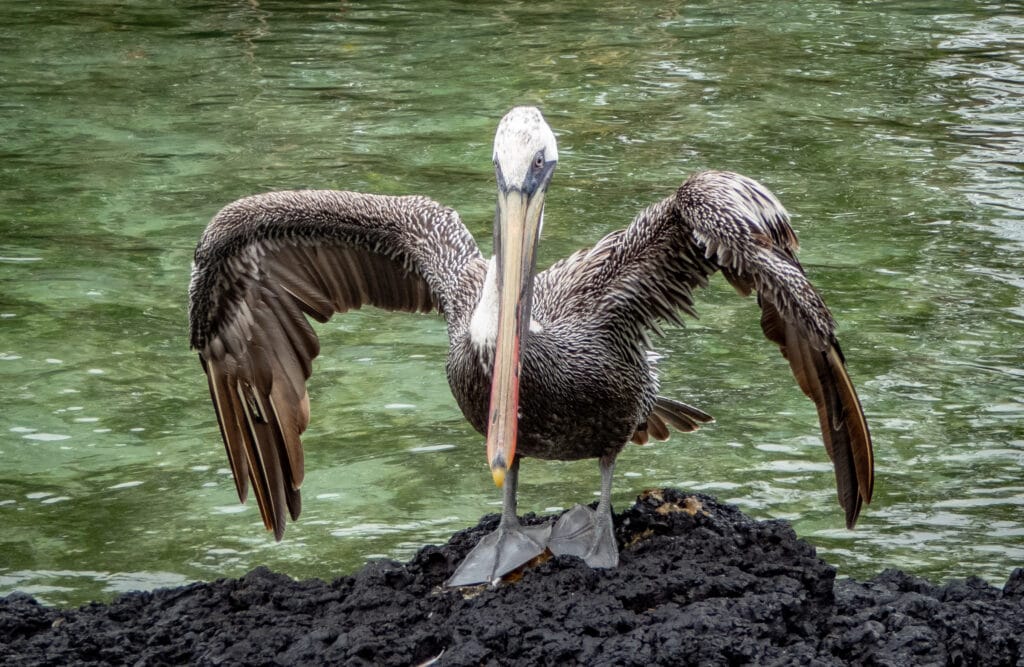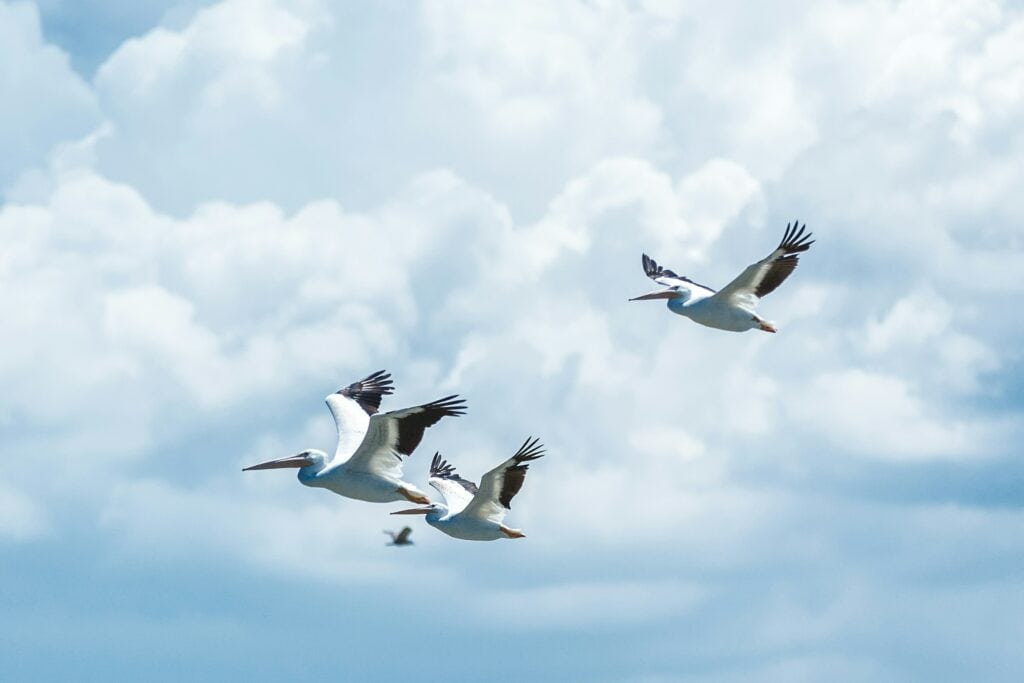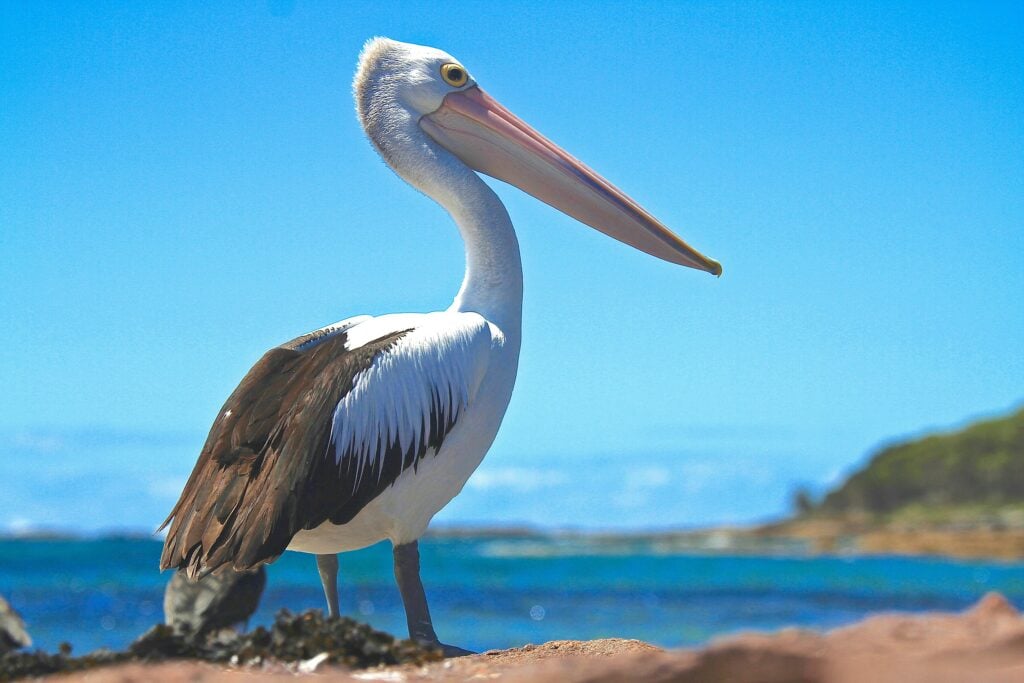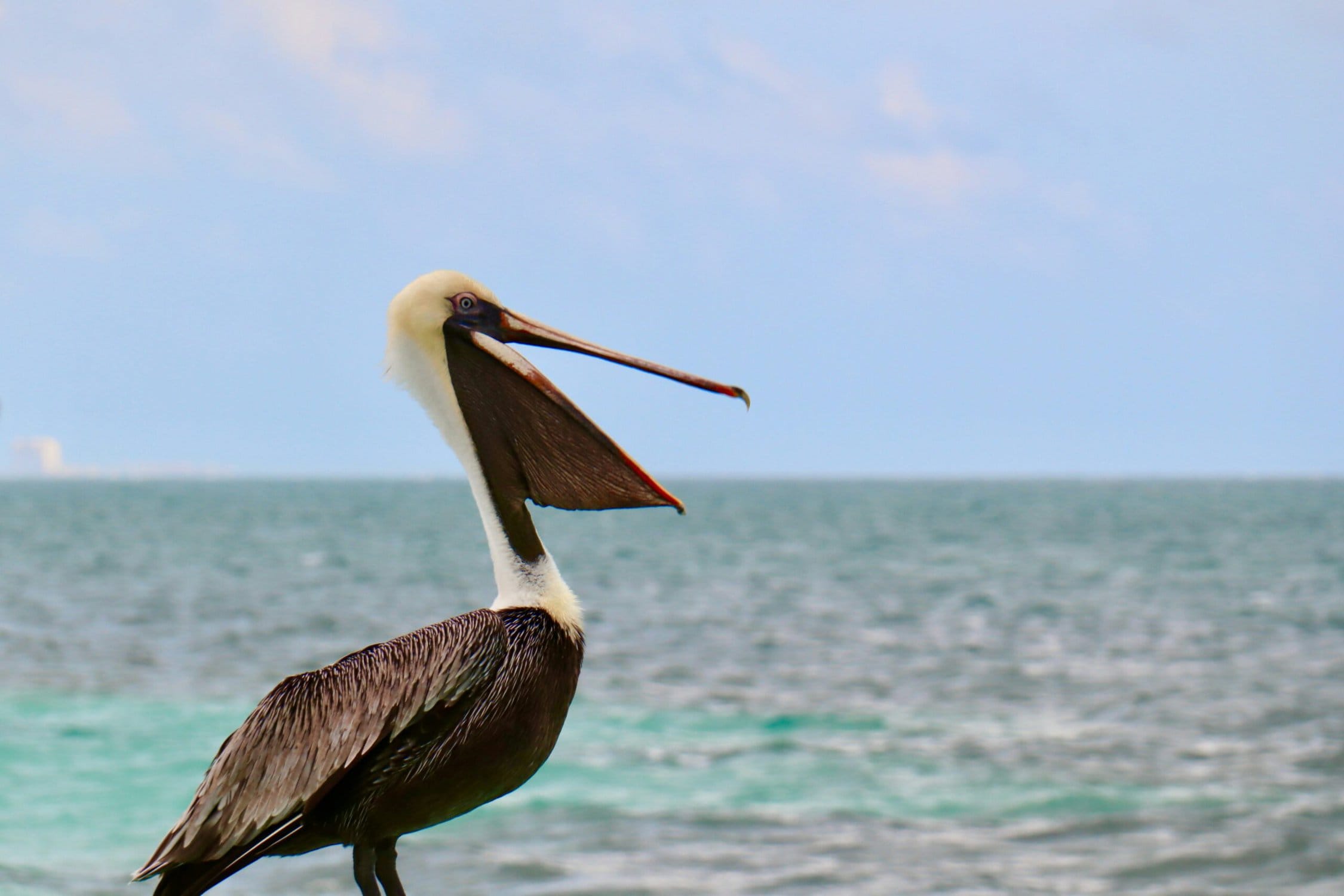Pelicans are unique and fascinating birds that symbolize the beauty and majesty of the sea. Whether you’re researching the pelican spirit animal or looking for help understanding pelican symbolism in art or literature, I’ll walk you through my research so you can make the most of the wisdom that pelican’s have to share.
When you think of the seaside, what images come to mind? The sand? The spray of the sea? For many of us, a trip to the sea is synonymous with the persistent mewing of seagulls. But there is another bird that I associate with the seaside. Pelicans might not be so loud as seagulls, but their presence is still felt deeply along the coasts of the earth’s oceans.
They are ubiquitous, found on every continent except Antarctica. But there was a time when one of the most recognizable pelican species almost disappeared from entirely. More on that later. That near miss makes it all the more obvious how beautiful and truly irreplaceable pelicans are.
As we explore pelican symbolism, pelican mythology, and many other sources of meanings for the pelican, I hope you’ll keep in mind how close we came to losing something precious. If you have a particular question you’d like to answer, you can check out the table of contents below for quick summaries of each section and click the link to jump to the section to learn more.
If there’s an aspect of pelican symbolism that hasn’t been explored here, feel free to comment with questions or suggestions. Check out my other articles for help finding your spirit animal and to learn more about bird and wildlife symbolism.
Pelican Symbolism and Meaning
Pelican symbolism is endlessly interesting. But when I think of pelicans, one of the first things I think of is conservation. In 1972, the usage of a harmful pesticide known as DDT was banned in the United States. This could not have come too soon for many of the animals effected by DDT, but especially for several large bird species. The California Condor, Bald Eagle, and Peregrine Falcon are some of the most noteworthy birds affected.
DDT moved up the food chain through a process known as biomagnification, meaning that animals that ate a large number of smaller prey collected toxins quickly. This affected both birds of prey and seabirds that eat lots of fish. The main consequence of DDT was weakened eggshells, meaning that the weight of the developing chick was too much for the egg.
This made DDT especially problematic for the Brown Pelican. Not only are Brown Pelican chicks large, but their parents actually stand on top of eggs to incubate them. This concentrates their weight and puts a huge amount of strain on DDT-weakened eggs. The results were catastrophic and the Brown Pelican was very nearly driven to extinction. It was thanks, in large part, to dedicated conservation efforts that the Brown Pelican was able to stage an incredible come back and was even removed from the endangered species list in 2009.

So, to me, the Brown Pelican is a symbol of triumph. It symbolizes tenacity, the importance of not counting yourself out just because you’re down, and the real benefits you can reap by putting in some hard work. Pelicans represent revitalization, regrowth, and learning from mistakes.
Pelicans may also represent navigation and safe travels. They are sea birds most commonly seen near coastlines, so for sailors a pelican might represent homecoming. They may also represent anglers. Pelicans are often seen with fish in their large bills, so they represent an abundant catch or a stroke of good luck.
What you might not know is that pelicans are also death-defying daredevils. They often fish by diving into the sea at break-neck speeds and from dizzying heights. Pelicans survive these crazy crash dives by twisting their neck and esophagus to the side to shield it from harm and inflating little sacs of air under their skin to act as air bags and cushion their vital organs. So, pelican symbolism can be connected to courage, recklessness, survival, and the ability to bounce back.
Finally, I have to point out that the pelican is not a bird with a squeaky clean rap sheet. Pelicans are known thieves. Just ask any fisherman who has fished off of a coastal dock. They aren’t above begging for handouts, they’ll readily steal from other birds, and their brazenness and apparent appetite have made them the subject of many viral videos, including that famous one where a pelican tries in vain to eat a capybara that’s much to large to fit in its mouth. So, pelicans can symbolize gluttony, appetite, brazenness, thievery, dishonesty, or foolishness.
Pelican Native American Symbolism
Native American pelican symbolism connects pelicans with medicine. Some tribes may have also connected pelicans with the weather. Unfortunately, there isn’t a lot of literature on Native American pelican symbolism, but, like many seabirds, it’s possible that some tribes may have connected them with coastal storms.
Pelican Celtic Symbolism
the Irish sea god, Mannanan Mac Lir, is often connected with seagulls and seabirds. Pelicans might be seen as connected with him and with the broader power and mystery of the ocean. Mannanan Mac Lir is a god connected with protection for sailor, so Celtic pelican symbolism can be thought of as representing safe passage.
Pelicans also appear often in heraldry as symbols of self-sacrifice, motherhood, and love. We’ll dig into that more in the next section, but the pelican’s heraldic meaning is important to understanding it as a Celtic symbol.
Pelican Christian Symbolism
It might not look like the most religious bird, but the theology of the pelican is actually a fascinating topic. In Christian symbolism, the pelican represents self-sacrifice, selflessness, love, and nurturing. This symbolism comes from an idea that is thought to date back to before Christianity. Perhaps because pelicans have bright orange bills, or perhaps because they sometimes rest the tip of their bill against their chests, it was once thought that a mother pelican would nurture her young by piercing her own chest with her bill and feeding her young with her own blood.

Although this isn’t exactly true, it came to be associated with Jesus Christ’s sacrifice for humankind as well as Mary’s exemplary holy motherhood. As such, symbols of pelicans feeding their young in this way are found throughout Medieval religious art.
Pelicans in Dreams
Dreaming of a pelican might mean that bountiful opportunities are headed your way. The pelican is an excellent angler who knows how to fill its belly. But pelicans also have to perform pretty frightening dives to pull off the fishing feats necessary to earn their dinner.
A pelican dream might mean that you need to trust the process, face your fears, and take the plunge in order to reap your well-deserved reward.
Dreaming of a pelican on land might represent a period of rest in your future. Don’t be anxious if life calms down for a while. Enjoy the inactivity and be ready to leap back into the action when the time comes.
Dreaming of a pelican at sea may mean that you’re heading into uncertain waters. Be vigilant and focus your energy on navigating the unknown safely.
Pelican Encounters and Omens
A pelican encounter can be a really fun experience. Encountering a pelican in flight, you may be struck by how elegant and effortless they look, while on land, pelicans tend to be a bit ungainly and awkward. So, a pelican encounter can help you remember not to judge a book by its cover. We all have strengths and weaknesses and we all shine when we’re in our element.
Encountering a brazen pelican; one that tries to steal your lunch or your catch, can represent the energy sinks in your life. If you’re putting so much effort into your work and getting nothing in return, remember that feeding an energy drain is only going to make it come back for more. Set boundaries and focus your efforts on areas where they are appreciated.
Pelicans in Mythology & Folklore
There is shockingly little pelican mythology to be found, but I’ve compiled what I could find anyways. Here are just a few pieces of pelican folklore.
I would also like to note that apparently pelicans are a prominent and sacred figure in Aboriginal folklore. I couldn’t find a good source for any specific stories, so I’d be happy to read one if you happen to have it.
Pelicans in Native American Mythology:
An Siuslaw myth describes the pelican as a master fisherman and sea-dweller. According to this pelican myth, it was actually thanks to the pelican’s advice that the seagull came to live by the sea. The seagull used to fish in rivers, but she saw that the pelican lived off of the ocean. When she asked him about it, he explained to her that the ocean has more fish and that if she lived at sea then he would make sure she never went hungry. This is how the seagull became a seabird.

Pelicans in Greeks Mythology:
Pelicans themselves don’t really feature in Greek myth, but seabirds do play an important role. According to the myth of Alcyone, a beautiful young woman named Alcyone and her lover, a man named Ceyx, were so deeply in love that even the gods admired their romance.
But Alcyone and Ceyx didn’t know that the gods were watching them. they secretly compared themselves to Zeus and Hera, which the gods found to be arrogant and insulting. So, Ceyx was cursed to die at sea. Alcyone begged him never to sail, but he ignored her. He embarked on a voyage one day and Zeus fulfilled the prophecy and struck down his ship.
When Ceyx’s body washed up on shore, Alcyone was so heartbroken that she drowned herself in the sea. the gods felt remorse and pity for what they had done, so they turned the two ill-fated lovers into seabirds. From then on, Alcyone was doomed to try and build a nest at sea, but the waves continually dashed and broke it. The gods took pity on her again and ordered a special period of calm for her to build her nest. This period of calm is the origin of the expression “Halcyon Days.”
With this myth in mind, pelicans can be thought of as representing a period of peace or calm in one’s life as well as a feeling of nostalgia.
Pelican Spirit Animal
The pelican spirit animal is deeply connected with courage. People with the pelican as their spirit animal are fearless. For some, this might mean adventurous crazy hobbies, but for others it simply means that they have the courage to live authentically as themselves. Pelican spirits are not afraid of the social repercussions of being eccentric or going against the grain.
People with the pelican spirit animal are undeterred by roadblocks. They are absolute go-getters with the brazenness to pursue their dreams and ambitions relentlessly.

If you have the pelican spirit animal, then you already know that there is almost nothing you can’t accomplish when you’re determined to do so. Just remember to look before you leap!
Pelican Totem Animal
The pelican totem animal is connected with safe passage. People with this totem animal are excellent navigators with an innate sense of direction and a strong connection to the places that they consider safe. Home is very important to the pelican totem. Even when they are traveling. If the pelican totem doesn’t have a safe home base they may feel unstable or insecure.
If your totem animal is the pelican then you’re probably the person in your family or friend group who makes sure everyone else gets home safe. While they may not always notice it, you do this as an expression of love for the one’s closest to you.
Pelican Power Animal
The power of the pelican is attraction. Call on the pelican power animal when you’re hoping for good things to enter your life. The pelican power animal brings good luck and bounty to those who are confident and relaxed. If you expect good things, they are bound to come your way.
The pelican power animal can be a potent guide for people who are trying to figure out whether they have chosen the right path or not. The pelican power animal brings happy returns to those who choose their path wisely and look to the future with optimism.
Pelican Tattoo Meaning
If you have a pelican tattoo then you might have already chosen a few meaningful ideas to connect it with. But if you’re thinking of getting one, learning more about pelican tattoo symbolism might help you decide if this is the right ink for you. Possible meanings of a pelican tattoo include:
- Tenacity
- Rejuvenation
- Sacrifice
- Love
- Selflessness
- Courage
- Brazenness
- Protection
- Homecoming
- Good luck
- Happy returns
Conclusion
Hopefully this article has taught you something about pelicans. Researching its material has certainly taught me a lot. After reading about their death-defying dives and the Brown Pelican’s near miss with extinction, I’m struck by the seemingly inexhaustible confidence of the pelican. Pelicans are birds that aren’t afraid to take too big of a bite out of life.
They go after what they want and they bounce back from almost impossible odds. That’s the pelican wisdom that I hope to take with me. Feel free to share in the comments if there’s something about the pelican that has spoken to you.

